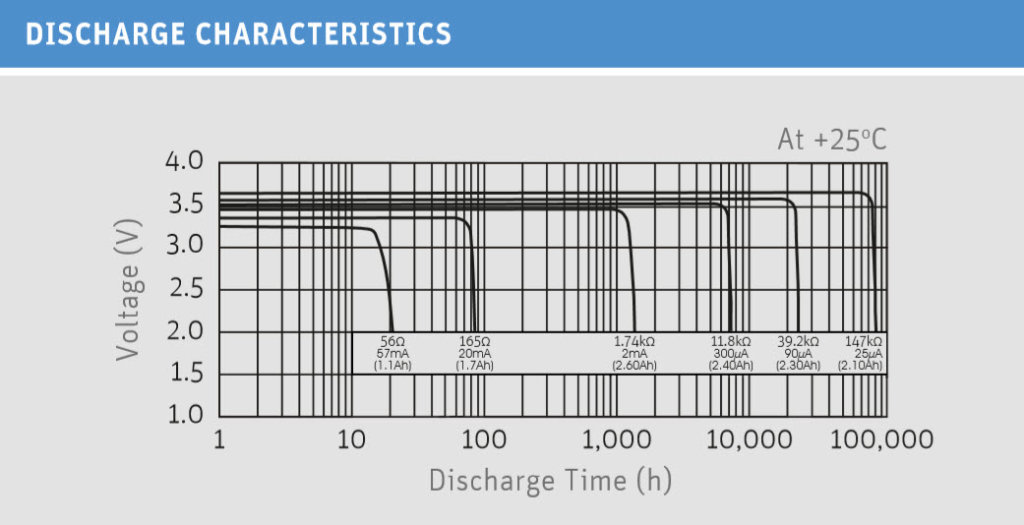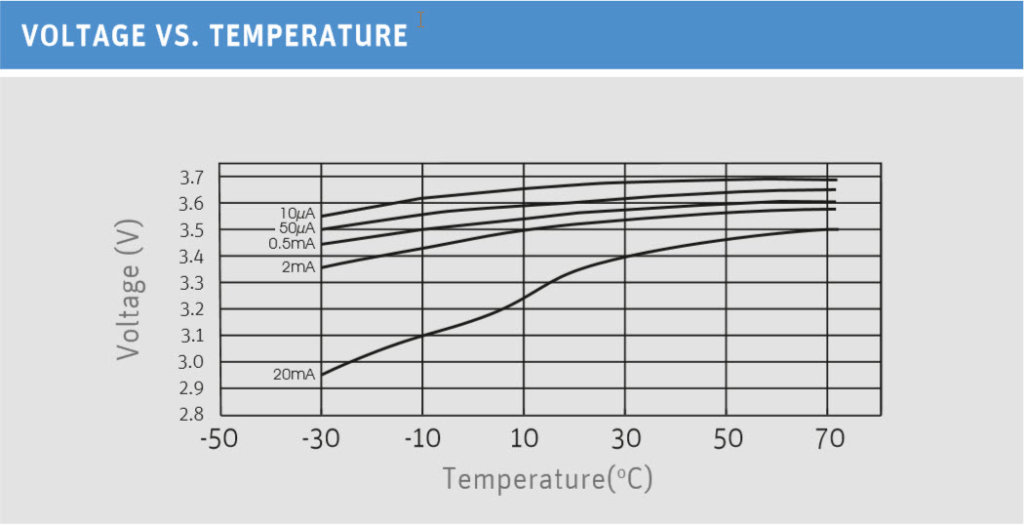Lithium thionyl chloride (Li/SOCl₂) batteries are part of the lithium primary cell family. Unlike lithium-ion or lithium-polymer batteries, these cells cannot be recharged once depleted. However, given their exceptionally long lifespan, this limitation has minimal impact in everyday applications. In fact, Li/SOCl₂ batteries can provide power for several months—or even years—before replacement is needed.
Li/SOCl₂ batteries have been a core component of Jauch’s battery portfolio for many years. This year, the lineup has expanded to include batteries under Jauch’s own brand. The key properties of this battery chemistry are summarized below.
High Voltage – High Safety
Lithium primary cells—including lithium iron sulfide and lithium manganese dioxide batteries—typically have a cell voltage ranging from 1.5 to 3 volts. In contrast, lithium thionyl chloride (Li/SOCl₂) batteries offer a significantly higher voltage of 3.6 volts, comparable to that of lithium-ion batteries. This voltage remains nearly constant throughout almost the entire discharge cycle, making it a distinctive advantage of Li/SOCl₂ cell chemistry.
Li/SOCl₂ batteries also excel in energy density compared to other primary cells, achieving up to 710 watt-hours per kilogram, further highlighting their superior performance.

Constant voltage: Li/SOCl₂ batteries deliver a constant voltage of 3.6 volts until almost complete discharge.
Low Currents – Wide Temperature Range
Lithium thionyl chloride (Li/SOCl₂) batteries are ideal for applications that require low current over extended periods. Common uses include locking cylinders, timers, toll systems, and various metering devices. Thanks to their high energy density, these batteries can power such applications for months or even years without needing replacement.
These batteries are engineered to operate across a wide temperature range, from –60°C to +85°C. Their performance at low temperatures is particularly impressive, as they maintain a consistently high voltage even in extreme subzero conditions.
 Temperature: Li/SOCl₂ batteries from Jauch reliably deliver high voltages even at double-digit sub-zero temperatures.
Temperature: Li/SOCl₂ batteries from Jauch reliably deliver high voltages even at double-digit sub-zero temperatures.
Passivation of the Battery
Lithium thionyl chloride (Li/SOCl₂) batteries are highly durable and boast an excellent shelf life, with a self-discharge rate of just 1% per year.
This remarkable longevity is a result of the cell’s unique chemistry. Unlike other lithium primary cells, Li/SOCl₂ batteries undergo a chemical reaction between the lithium anode and the electrolyte, forming a protective layer over the anode. This process is known as “passivation.” The passivation layer slows ion flow between the anode and cathode.
Passivation has both benefits and limitations. On the positive side, it is responsible for the battery’s extremely low self-discharge rate. On the downside, the protective film initially restricts current flow when the battery is first put into operation. As the battery continues to operate, the film gradually diminishes, but it reforms whenever the battery is idle.
Because of this behavior, lithium thionyl chloride batteries are particularly well-suited for low-power applications, whether the power demand is continuous or delivered in pulses.
The Bobbin-Type Cell Construction
Lithium thionyl chloride batteries come in a wide range of sizes and designs. Regardless of the variation required for a specific application, the core attributes—high voltage, high energy density, and long service life—remain consistent.
The bobbin-type construction has become the most commonly used design for these cells. This configuration, employed in Jauch’s thionyl chloride batteries, is known for its exceptional safety and extended lifespan. Batteries with this construction can deliver currents of up to two amperes, making them suitable for a variety of industrial and low-to-medium power applications.
Comments
Please Join Us to post.
0